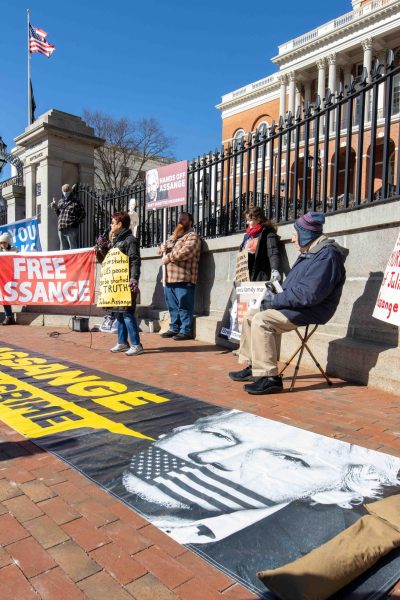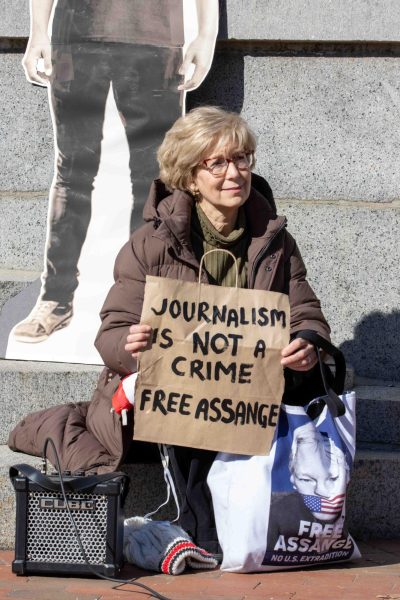About two dozen people gathered at the steps of the Massachusetts Statehouse equipped with picket signs, banners, and a microphone to protest the extradition of activist Julian Assange last Tuesday.
Assange is the founder of WikiLeaks, a nonprofit online media publication that rose to prominence in the 2000s for releasing anonymously leaked classified documents from world governments and corporations.
The protest was put on by the Boston Area Assange Defense, a local chapter of a national coalition that advocates Assange’s freedom from incarceration in Belmarsh Prison in London and from extradition attempts under the Trump and Biden administrations. In the U.S., Assange could face up to 175 years if convicted on espionage charges for the publication of classified U.S. military and State Department documents on the Iraq and Afghanistan Wars in 2010.
The protest was co-sponsored by Massachusetts Peace Action, a nonprofit public advocacy group with a focus on grassroots activism for global peace, nuclear disarmament, and environmentalism.
“What we do at Mass Peace Action is we fight against militarism, so the support of journalism about U.S. militarism, it’s intricately linked (to our mission),” Brian Garvey, the assistant director of Mass Peace told the Beacon at the rally.
Last Tuesday marked the first day of a trial in Britain’s High Court, which will decide whether to grant Assange a new appeal against his extradition to the U.S., signed into order by the British Parliament in June 2022. Protesters gathered en masse outside the High Court in London on Tuesday alongside Assange’s wife, Stella.
Protesters at the State House said their gathering was to voice support for a resolution in the House of Representatives, Resolution 934, which states that “the United States ought to drop all charges against and attempts to extradite Julian Assange.” They hope the resolution will influence President Biden and Attorney General Merrick Garland to dismiss his charges.
Rep. Jim McGovern (D-MA), who is one of eight co-sponsors on the bill, has been working with Assange Defense to raise awareness about the Assange case and petition other representatives to join him in supporting the resolution.
McGovern could not attend the protest but sent a letter, which was read to the crowd by Julia Hansen, a local climate activist and Assange Defense volunteer.
“I know that Mr. Assange is a controversial figure, and I understand why many people think it is wrong for him to publish classified documents… but there is no question in my mind that prosecuting him under the 1917 Espionage Act for publishing that material is a terrible mistake that undermines press freedom,” wrote McGovern.
Addressing Resolution 934, which was introduced by Rep. Paul Gosar (R-AZ), McGovern wrote, “I don’t agree with Mr. Gozar on almost anything, but we do agree that freedom of the press and journalism should be protected. Thankfully, there is still bipartisan support for this core idea.”
If he is not granted appeal, Assange will be extradited, which many, including his wife and legal team, see as a death sentence due to his deteriorating health since his incarceration in Britain began in 2019. U.S authorities in 2021 said that Assange would not be held in a Supermax prison if extradited after concerns were raised that he would be sent to the Administrative Maximum Facility (ADX) in Florence, Colorado, one of the strictest prisons and only federal supermax in the country.

Susan Mortimer, a protester and activist with interests in reforming the American prison system and freeing political prisoners, said the conditions at the ADX would be worse than what Assange is facing at Belmarsh. She recently spoke to a Sudbury native who was newly freed from the ADX after 12 years and heard firsthand the conditions that prisoners there face.
“That’s the worst prison in the country…it’s just horrendous what happens (there),” Mortimer said.
Belmarsh is a Category A prison in Britain, equivalent to maximum security in the United States.
“If you see photos of Julian Assange, you’ll see an old man…he’s being destroyed, and that’s deliberate,” Mortimer said.
Rick Peltz-Steele is a Chancellor Professor of Law at the University of Massachusetts, who, along with 35 other law professors, signed a letter earlier this month advocating for Assange’s freedom on a constitutional basis, which they sent to the Attorney General. He spoke to the crowd about the importance of Assange’s work to democracy.
“(Assange) developed this amazing idea about freedom of information absolutism (and) getting everything in the open,” said Peltz-Steele. “You can’t form coherent policy positions and speak freely about political positions unless you have the information on which to base them.”
Hansen agrees that democracy cannot function without the free flow of information that she believes figures like Assange facilitate.
“It’s a classic New York Times problem,” she said, referencing the Pentagon Papers. “If Julian Assange is persecuted because of publishing truthful information, then any journalistic outlet can be prosecuted for even republishing that same information.”
For Joe Kebartas, a Vietnam War veteran who attended the protest, the positive effects of informing the public on classified information can not be understated.
Kebartas agrees with Assange’s message that “War starts with lies and ends with truth.” He sees a connection between the Iraq war leaks of Wikileaks and the Pentagon Papers State Department Leaks of 1971, which he said “saved his life.”
The Pentagon Papers leak revealed the government had doubted the winnability of Vietnam for four administrations, even as they continued to send more troops and resources to the war. They were leaked to the New York Times by whistleblower Daniel Ellsberg.
“When (the Pentagon Papers) came out in ’71, I was in Vietnam,” said Kebartas. “I was supposed to be there a year, (but after the publication of the Papers)…they had big troop withdrawals so I could get out of Vietnam earlier.”
However, Kebartas sees a concerning difference between these two causes of document leaking in how the government has treated the whistleblowers and publishers. The government, he said, read the Pentagon Papers into the Senate to void Ellsberg’s espionage charges, demonstrating a level of support for him they have not afforded Assange.

Attempts by Nixon election committee staffers to tamper with Ellsberg’s case by breaking into his psychiatrist’s office also aided in the dismissal of his criminal case.
“(I) do not feel that (mainstream media is) covering this at all,” said Tom Carpenter, a protester who explained he prefers to get his news from alternative media sources like Substack and YouTube. “You would think that there would be a lot more outrage about this on the part of the media…(but) a lot of the media is owned, controlled by people that have a vested interest in not having free speech.”
Assange’s trial finished hearing arguments last Wednesday, and the two senior judges who will decide on the case said they will reserve their decision for a later date. It is unclear when the decision will be released.
“The history of the crimes of the United States is very long,” said Carpenter. “Without (publications like Wikileaks), there’s no hope that things would be different.”